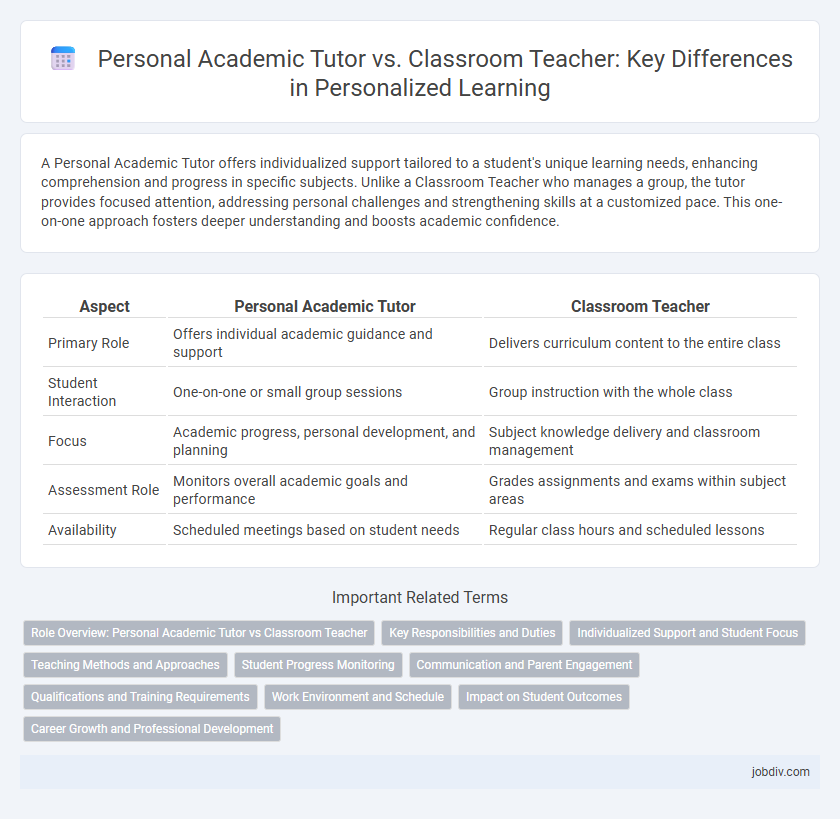A Personal Academic Tutor offers individualized support tailored to a student's unique learning needs, enhancing comprehension and progress in specific subjects. Unlike a Classroom Teacher who manages a group, the tutor provides focused attention, addressing personal challenges and strengthening skills at a customized pace. This one-on-one approach fosters deeper understanding and boosts academic confidence.
Table of Comparison
| Aspect | Personal Academic Tutor | Classroom Teacher |
|---|---|---|
| Primary Role | Offers individual academic guidance and support | Delivers curriculum content to the entire class |
| Student Interaction | One-on-one or small group sessions | Group instruction with the whole class |
| Focus | Academic progress, personal development, and planning | Subject knowledge delivery and classroom management |
| Assessment Role | Monitors overall academic goals and performance | Grades assignments and exams within subject areas |
| Availability | Scheduled meetings based on student needs | Regular class hours and scheduled lessons |
Role Overview: Personal Academic Tutor vs Classroom Teacher
A Personal Academic Tutor primarily offers tailored academic guidance, supports students' personal development, and monitors individual progress throughout their studies, fostering a deeper mentor-mentee relationship. In contrast, a Classroom Teacher delivers subject-specific instruction to groups, manages classroom dynamics, and assesses student performance through exams and coursework. Both roles emphasize student success but differ in scope: the tutor's focus is personalized support, while the teacher targets curriculum delivery and classroom management.
Key Responsibilities and Duties
A Personal Academic Tutor provides individualized guidance, monitors academic progress, and supports personal development tailored to each student's needs. Classroom Teachers deliver structured lessons, manage classroom dynamics, and assess student performance across a curriculum. While tutors focus on personalized mentoring and academic advising, teachers emphasize content delivery and classroom management.
Individualized Support and Student Focus
A Personal Academic Tutor provides tailored guidance that addresses each student's unique learning style and academic goals, ensuring personalized support beyond standard curriculum requirements. Classroom Teachers manage group instruction, prioritizing curriculum delivery and maintaining a learning environment for diverse learners simultaneously. The focused, one-on-one interaction with a Personal Academic Tutor drives deeper understanding and targeted skill development compared to the broader approach of Classroom Teachers.
Teaching Methods and Approaches
Personal Academic Tutors employ individualized teaching methods tailored to a student's unique learning style, enabling focused attention and personalized feedback. Classroom Teachers utilize structured approaches designed for group instruction, incorporating diverse activities and peer interaction to foster collaborative learning. Both roles integrate formative assessments, but Personal Academic Tutors emphasize adaptive strategies to address specific academic challenges efficiently.
Student Progress Monitoring
Personal Academic Tutors provide one-on-one guidance tailored to individual learning needs, enabling more precise monitoring of student progress compared to Classroom Teachers. They can quickly identify knowledge gaps and adjust strategies to boost academic performance. Classroom Teachers manage broader group dynamics, which often limits their ability to track each student's progress in detail.
Communication and Parent Engagement
Personal Academic Tutors offer tailored communication focused on individual student progress, fostering stronger parent engagement through regular, personalized updates. Classroom Teachers manage communication on a broader scale, often limiting direct interaction with parents due to larger class sizes. Enhanced one-on-one dialogue with Personal Academic Tutors supports timely interventions and collaborative strategies for academic improvement.
Qualifications and Training Requirements
Personal Academic Tutors typically hold advanced degrees in their subject area and often possess specialized certifications in tutoring or academic coaching, emphasizing one-on-one instructional methods. Classroom Teachers are required to have formal teaching qualifications such as a bachelor's degree in education and state or national teaching licenses, ensuring competency in curriculum delivery and classroom management. Training programs for Classroom Teachers prioritize pedagogical theory, assessment strategies, and classroom dynamics, while Personal Academic Tutors focus more on personalized learning techniques and adapting to individual student needs.
Work Environment and Schedule
A Personal Academic Tutor often enjoys a flexible work environment, allowing for tailored one-on-one sessions that accommodate both student and tutor schedules. Classroom Teachers operate within structured school timetables and fixed locations, managing larger groups of students simultaneously. The tutor's schedule tends to be more adaptable, while classroom teachers adhere to consistent daily hours and curriculum deadlines.
Impact on Student Outcomes
A Personal Academic Tutor provides tailored guidance that addresses individual learning styles and challenges, significantly improving student motivation and performance. Classroom Teachers manage diverse groups, which can limit personalized attention and affect the depth of understanding for each student. Research indicates students with personal tutors often achieve higher grades and demonstrate greater academic confidence compared to those relying solely on traditional classroom instruction.
Career Growth and Professional Development
A Personal Academic Tutor provides tailored guidance in career growth by offering individualized feedback and targeted skill development, enhancing students' professional trajectories more effectively than a Classroom Teacher who addresses a broader curriculum. The one-on-one mentorship from a Personal Academic Tutor accelerates professional development through personalized goal setting and continuous support. Classroom Teachers contribute foundational knowledge but often lack the capacity to deliver customized career advice essential for specialized advancement.
Personal Academic Tutor vs Classroom Teacher Infographic

 jobdiv.com
jobdiv.com